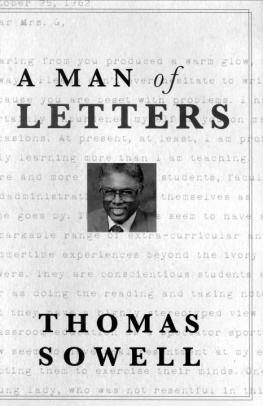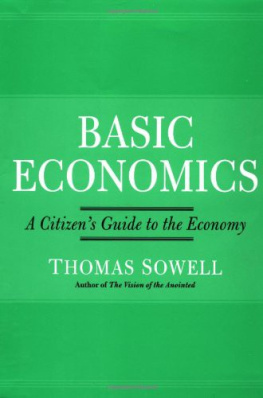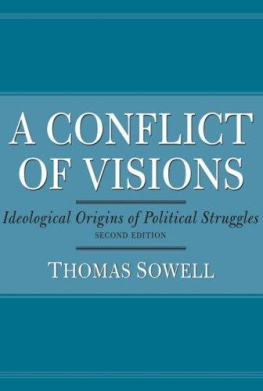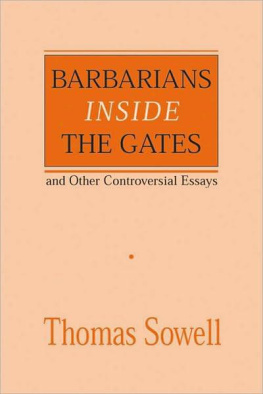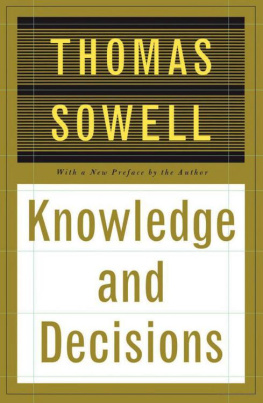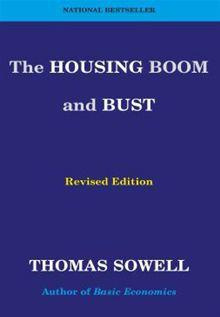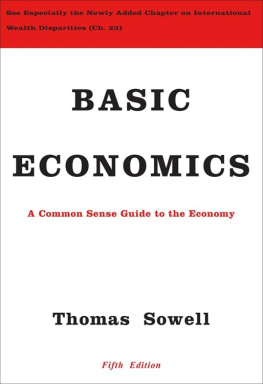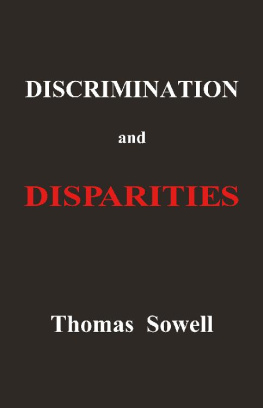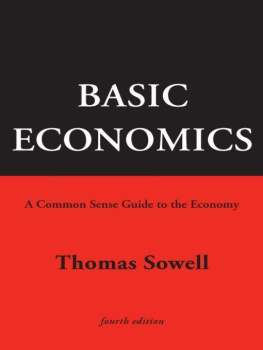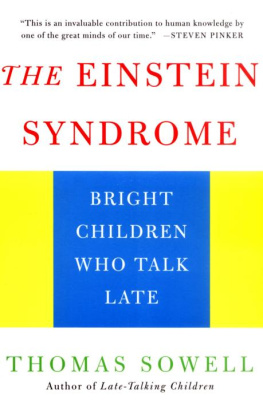Thomas Sowell - A Man of Letters
Here you can read online Thomas Sowell - A Man of Letters full text of the book (entire story) in english for free. Download pdf and epub, get meaning, cover and reviews about this ebook. year: 2009, genre: Art. Description of the work, (preface) as well as reviews are available. Best literature library LitArk.com created for fans of good reading and offers a wide selection of genres:
Romance novel
Science fiction
Adventure
Detective
Science
History
Home and family
Prose
Art
Politics
Computer
Non-fiction
Religion
Business
Children
Humor
Choose a favorite category and find really read worthwhile books. Enjoy immersion in the world of imagination, feel the emotions of the characters or learn something new for yourself, make an fascinating discovery.
- Book:A Man of Letters
- Author:
- Genre:
- Year:2009
- Rating:5 / 5
- Favourites:Add to favourites
- Your mark:
- 100
- 1
- 2
- 3
- 4
- 5
A Man of Letters: summary, description and annotation
We offer to read an annotation, description, summary or preface (depends on what the author of the book "A Man of Letters" wrote himself). If you haven't found the necessary information about the book — write in the comments, we will try to find it.
A Man of Letters — read online for free the complete book (whole text) full work
Below is the text of the book, divided by pages. System saving the place of the last page read, allows you to conveniently read the book "A Man of Letters" online for free, without having to search again every time where you left off. Put a bookmark, and you can go to the page where you finished reading at any time.
Font size:
Interval:
Bookmark:

Thomas Sowell
Composition by Na Liu editing by Elizabeth Costa, and hook design by Thomas Sowell

When looking back over our lives, memories may fade or be fickle, but letters don't change with time. Letters served as an anchor in reality when I was writing my little memoir, A Personal Odyssey. Now the four filing cabinets in my garage, full of letters going back more than half a century, permit a more in-depth look at a long life that has now spanned about a third of the entire history of the United States. Many of these letters dealt with landmark events in the country and in the world, not just those in my personal life. They now permit a look back at the history of an era as well as the life of an individual.
This was an era of enormous changes in the world around me. When I was born on June 30, 1930, most Americans did not have a telephone or a refrigerator. My own family did not have electricity, central heating, or hot running water. The Great Depression of the 1930s was just getting under way. Franklin D. Roosevelt was still governor of New York, Winston Churchill was just a largely ignored backbencher in the British Parliament, and Adolf Hitler's National Socialist Party was still only the second-largest party in Germany. Who could have predicted at that time the world-shattering events in which they would all play major roles?
Who could have predicted even the more mundane story of a black child born to a maid in the Jim Crow South, his father having died before his birth'? The world I grew up in changed beyond recognition during my lifetime and these changes could not leave me unchanged. I often wonder what my mother, who died giving birth to my younger brother, would have made of our lives if she could see them unfolding. How could she have dreamed that the child she brought into the world at the cost of her life would someday be a jet propulsion engineer at NASA? Could she even have imagined rockets taking people to the moon? And would she have been much less surprised by my life'? Once, as a young man in my early twenties, I sat in my little studio apartment with another brother who had stopped by. We were commiserating with each other over the rough times we were going through. We both held entry-level jobs in the government and things were not going well, either on those jobs or in our personal lives. However, at one point my brother straightened up, looked directly at me and said: "If our mother were alive, she would think that we had succeeded beyond her wildest dreams."
Even at that point, neither I nor anyone else could have predicted the course my life would take that I would end up in a profession of which I had no conception at the time and in institutions I did not know existed. Looking back on it all now, I am struck by how easily things could have taken a different path at many points along the way, with many of those paths leading into blind alleys or even into death. The story of the path that they did take, and that the world around me took, is told in these letters.
Having been born in North Carolina and having grown up in Harlem, I had dropped out of high school in 1946 at age 16 and left home at age 17 to go live on my own, usually in a rented room. I discovered the hard way that there was no great demand for a high-school dropout with no skills or experience. I had no clear indication of where I was heading, if anywhere beyond the string of low-level, poorly-paying jobs I held. After nearly three tough years on my own, it was a major advance when I received an offer of a job as an entry-level clerk with the government in Washington in September 1950.
Washington was a new experience, going beyond a change of jobs and cities. In Washington lived a sister named Mary Frances and two brothers, William and Charles. A younger brother lived in North Carolina and another brother in Detroit. I never knew that any of them existed while I was growing up. I had been adopted in infancy and was not told that I had been adopted until I was nearly grown. Having left the family in which I had grown up when I was 17, 1 now had a new family and that was a good feeling. Washington itself was not a good experience, however, when I arrived there in 1950. Racial barriers made downtown restaurants and most movie houses off-limits. The schools were racially segregated. Washington was a typical Southern town in every way except that blacks did not have to ride in the back of buses and trolleys.
The Korean war was raging and my military draft status made it clear that my civilian days were numbered. After several months in Washington, I decided to spend my remaining time as a civilian back in New York. About five months after I returned to New York, I was drafted in October, 1951 and was surprised to find myself assigned to the Marine Corps instead of the Army. Heavy casualties among Marines in Korea had led the Marine Corps to take a share of the draftees to replenish their ranks. Dismayed as I was at the time to be in the Marines, which meant going back to the South again, to boot camp at Parris Island, South Carolina, in retrospect my two years of military service contributed much to my future, both financially and in terms of personal maturity. The G.I. Bill enabled me to go to college and college opened up new worlds for me.
While in the Marine Corps, I was sent to the photography school at the Naval Air Station in Pensacola, Florida. It was not only the best assignment during my military service, it gave me a marketable skill and a greater ability to enjoy photography-and photography remained a major interest for the rest of my life.
After being released from active military duty, I returned briefly to New York and then resumed my job as a government clerk in Washington, using the G.I. Bill to finance some evening courses at Howard University, a local black institution. This arrangement lasted about a year and a half, during which time I grew increasingly dissatisfied with Howard and finally took the desperate gamble of applying to higher powered and more expensive universities, including Harvard, even though this would require me to spend every dime I had, or could borrow, to finance my first year, in the hope of doing well enough that year to earn a scholarship that would supplement the G.I. Bill to finance the rest of the way.
It is doubtful whether I would have done so if I had had any realistic understanding of the odds against all this. But, despite some rocky times, it somehow worked out. I was admitted to Harvard on the strength of my test scores and some very strong letters of recommendation from my two favorite teachers at Howard University, the distinguished writer and poet Sterling Brown and a remarkable lady who taught me freshman English, Dr. Marie Gadsden. "Mrs. G," as I came to call her, also arranged for me to meet a lovely young lady who was attending Radcliffe, the women's college at Harvard in those days, though nothing came of it. But I remained in touch with Mrs. G, usually by letter, in the years ahead. A wise confidante, she became in fact the person with whom I exchanged the most letters over the next several decades.
After graduating from Harvard in 1958 with a degree in economics, I went on to a year of postgraduate study in economics at Columbia University, where I received a master's degree, and then on to the University of Chicago to work toward a Ph.D. in economics. This is where I was at the time when the first of these letters was written in 1960.
Font size:
Interval:
Bookmark:
Similar books «A Man of Letters»
Look at similar books to A Man of Letters. We have selected literature similar in name and meaning in the hope of providing readers with more options to find new, interesting, not yet read works.
Discussion, reviews of the book A Man of Letters and just readers' own opinions. Leave your comments, write what you think about the work, its meaning or the main characters. Specify what exactly you liked and what you didn't like, and why you think so.

